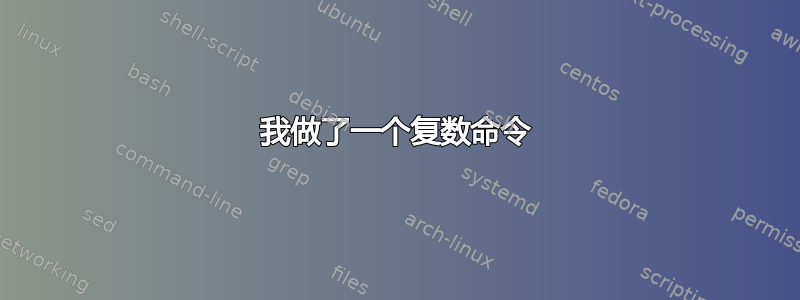
因此,我编写了一个命令作为家庭作业,以正确呈现复数。例如,当我写入\complfull{5}{-2}输出为 5-2i
\documentclass{scrartcl}
\usepackage{amsmath}
\usepackage{xstring} %this package is needed for the if else commands like \IfStrEq
\newcommand{\complfull}[2]{ %This bracket covers the case for when the real part is zero
\IfStrEq{#1}{0}{\IfStrEqCase{#2}{
{0} {0} %"If b is also zero, output zero"
{1} {i} %"If b is just one, output 'i'(instead of '1i')"
{-1} {-i}}
[#2\textit{i}]}{\IfStrEqCase{#2}{ %This bracket is the first command's "else" statement, so it covers the case when the real part is not zero
{0} {#1} %"If the imaginary part is zero, output the real part"
{1} {#1+i}
{-1} {#1-i}}
[\IfBeginWith{#2}{-} %This covers the case when the imaginary part is negative and the real part is not zero. It is necessary because we can't have a number be displayed as "1+-4i", and doing it with brackets would necessitate every imaginary part to be written with brackets.
{#1#2i}
{#1+#2i}]}
}
\begin{document}
\complfull{2}{-2}
\complfull{0}{1}
\end{document}
此代码为我提供了类似输入的错误消息,$\complfull{\dfrac{-1}{12}}{-3}$
这些是错误消息:
Undefined control sequence. $\complfull{\dfrac{-1}{12}}{-3}
TeX capacity exceeded, sorry [input stack size=10000]. $\complfull{\dfrac{-1}{12}}{-3}
但是,当我做类似的事情时,$\displaystyle\complfull{\frac{1}{2}}{-1}$它工作得很好。
导致这个问题的原因是什么?
答案1
切换到不同的测试方法并清理代码(我认为没有理由\textit{i}在这里使用,因为i在数学模式中已经是斜体了。
我确信这可以做得更简单。版本现在不再使用任何东西,因为xstring它们的测试相当脆弱。
使用\NewDocumentCommand{\complfull}{m >{\TrimSpaces} m}{确保#2永远不会以空格开头,因为这会破坏测试以查看虚部是否以开头-。
\documentclass[a4paper]{article}
\usepackage{amsmath}
\usepackage{etoolbox}
% this assumes the arg never starts with spaces
\def\ProcessFirstChar#1#2\END{%
\def\FirstChar{#1}
}
\def\DASHCHAR{-}
% input a,b, need to generate z = a+bi in a nice way
\NewDocumentCommand{\complfull}{m >{\TrimSpaces} m}{
% if a =0
\ifstrequal{#1}{0}{
\ifstrequal{#2}{0}{
0
}{
\ifstrequal{#2}{1}{
i
}{
\ifstrequal{#2}{-1}{
-i
}{
#2i% default
}
}
}
}{
% a is not zero
#1% just leave a
\ifstrequal{#2}{0}{%
% Im(z) = 0, so nothing
}{
\ifstrequal{#2}{1}{
+ i
}{
\ifstrequal{#2}{-1}{
-i
}{
% still need the case when b is negative, as we should not add a plus in this case
\expandafter\ProcessFirstChar#2\END
\ifx\FirstChar\DASHCHAR\else+\fi
#2i
}
}
}
}
}
\begin{document}
$\complfull{0}{0}$
$\complfull{0}{1}$
$\complfull{0}{-1}$
$\complfull{0}{5}$
$\complfull{1}{0}$
$\complfull{1}{1}$
$\complfull{1}{-1}$
$\complfull{1}{5}$
$\complfull{1}{-5}$
$\complfull{0}{3}$
$\complfull{a}{ - b}$
$\complfull{0}{3}$
$\complfull{\frac{-1}{12}}{-3}$
$\complfull{\dfrac{-1}{12}}{-\dfrac12}$
$\complfull{\dfrac{-1}{12}}{\dfrac12}$
\end{document}
答案2
(我重写了答案,以更普遍地解决 OP 的格式问题。)
这是一个基于 LuaLaTeX 的答案。它没有假设内容复数的实部和虚部,除了虚部可以以符号开头之外-。(相反,+不允许以符号开头;但是,如果需要,可以放宽此限制。)
该\complfull宏可以在文本和数学模式下使用。\complfull{\dfrac{-1}{12}}{-3}只要加载了amsmath提供该宏的包,就不会出现任何问题。\dfrac
% !TEX TS-program = lualatex
\documentclass{scrartcl}
\usepackage{amsmath} % for '\ensuremath' macro
\usepackage{luacode} % for 'luacode' env. and '\luastringN' macro
\begin{luacode}
function complfull ( re , im ) -- inputs: real and imag. parts
-- begin by stripping off any leading whitespace from 'im'
im = im:gsub ( '^%s*' , '' )
im = im:gsub ( '^%-%s*' , '-' )
if im == '0' then -- real number
return re
else
if re == '0' then -- imaginary number
if im == '1' then
return 'i'
elseif im == '-1' then
return '-i'
else
return im..'i'
end
else -- complex number
if im == '1' then
return re..'+i'
elseif im == '-1' then
return re..'-i'
else
if im:sub(1,1)=='-' then
return re..im..'i'
else
return re..'+'..im..'i'
end
end
end
end
end
\end{luacode}
\newcommand\complfull[2]{\ensuremath{\directlua{%
tex.sprint(complfull(\luastringN{#1},\luastringN{#2}))}}}
\begin{document}
\complfull{1}{0};
\complfull{0}{1},
\complfull{0}{-1};
\complfull{1}{1},
\complfull{1}{-1};
\complfull{\frac{1}{2}}{\frac{1}{2}},
\complfull{\frac{1}{2}}{-\frac{1}{2}};
\complfull{\dfrac{-1}{12}}{\exp(7)},
\complfull{\dfrac{-1}{12}}{-3}.
\end{document}
答案3
您的问题的答案是:$\complfull{\dfrac{-1}{12}}{-3}$生成错误,因为您的\complull宏应用于\IfStrEq其参数并\IfStrEq在处理过程中对其进行扩展\edef。 并且\dfrac宏未定义为\protected\def。 它使用一种\protect不适用于的旧且晦涩的 LaTeX 方法\edef。
你正在解决的问题很有趣。我展示了我们可以用 OpTeX 做什么:
\def\complfull#1#2{%
\isequal{#1}{0}\iftrue \printimpart\empty{#2}%
\else {#1}\printimpart+{#2}%
\fi
}
\def\printimpart#1#2{%
\qcasesof {#2}
{} {\ifx#1\empty 0\fi}
{0} {\ifx#1\empty 0\fi}
{1} {#1\imu}
{-1} {-\imu}
\_finc {\isminus #2\iftrue \else #1\fi {#2}\imu}%
}
\def\imu{{\rm i}}
\def\isminus #1#2\iftrue{\ifx-#1}
Test:
$\complfull{1}{0};
\complfull{0}{};
\complfull{0}{1};
\complfull{0}{-1};
\complfull{1}{1},
\complfull{1}{-1};
\complfull{1\over2}{1\over2},
\complfull{1\over2}{-{1\over2}};
\complfull{-1\over12}{\exp(7)},$
\bye
该宏是完全可扩展的,并且在处理宏时\complfull不会扩展其参数。\isequal\qcasesof



